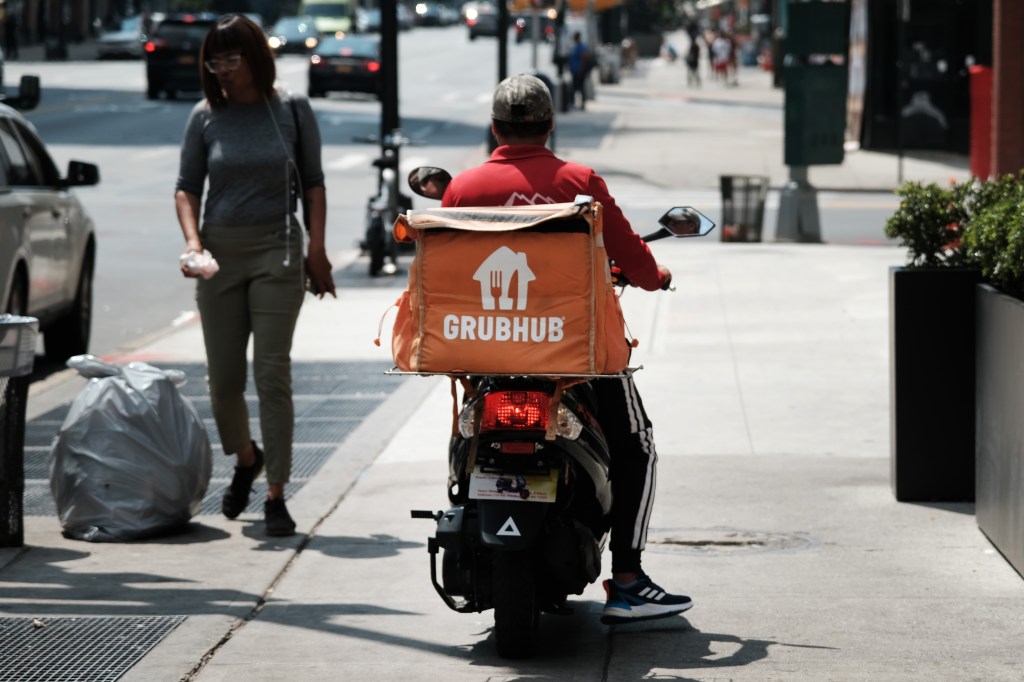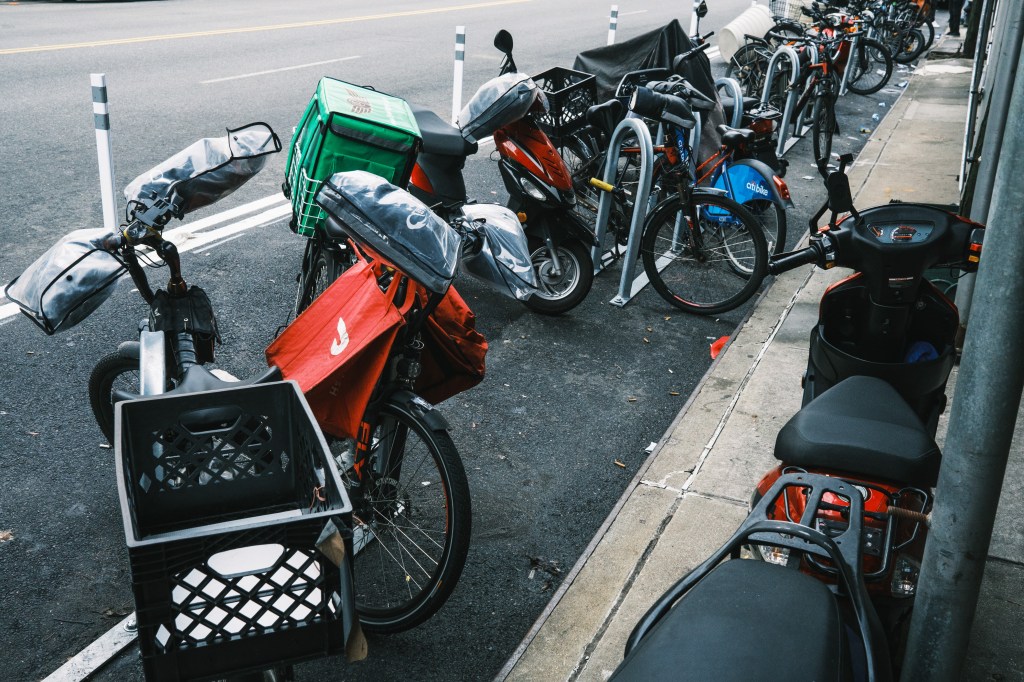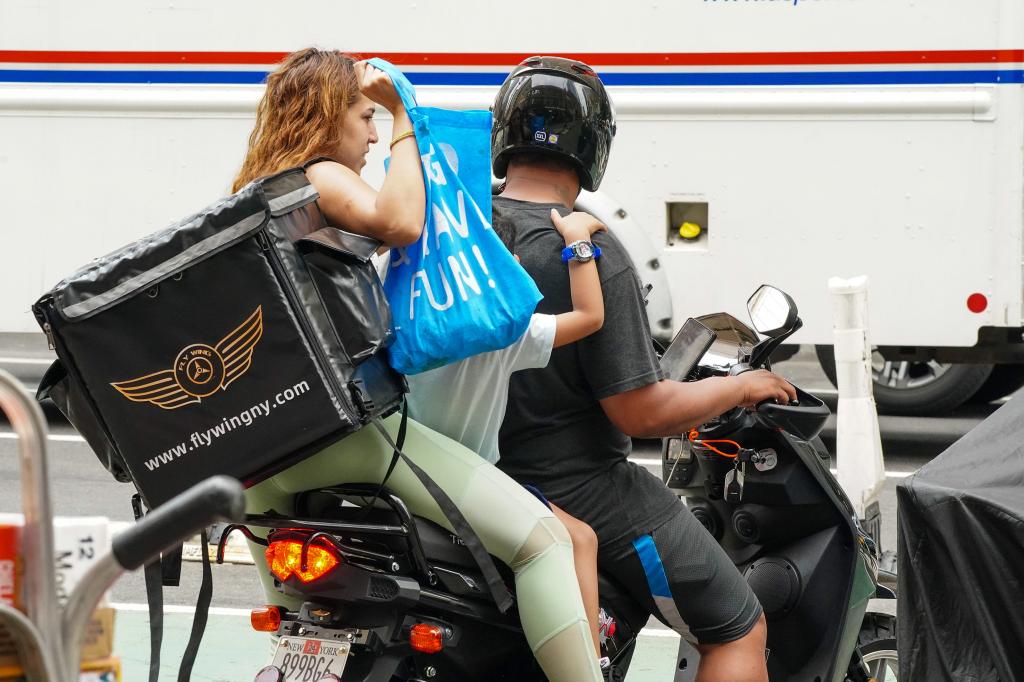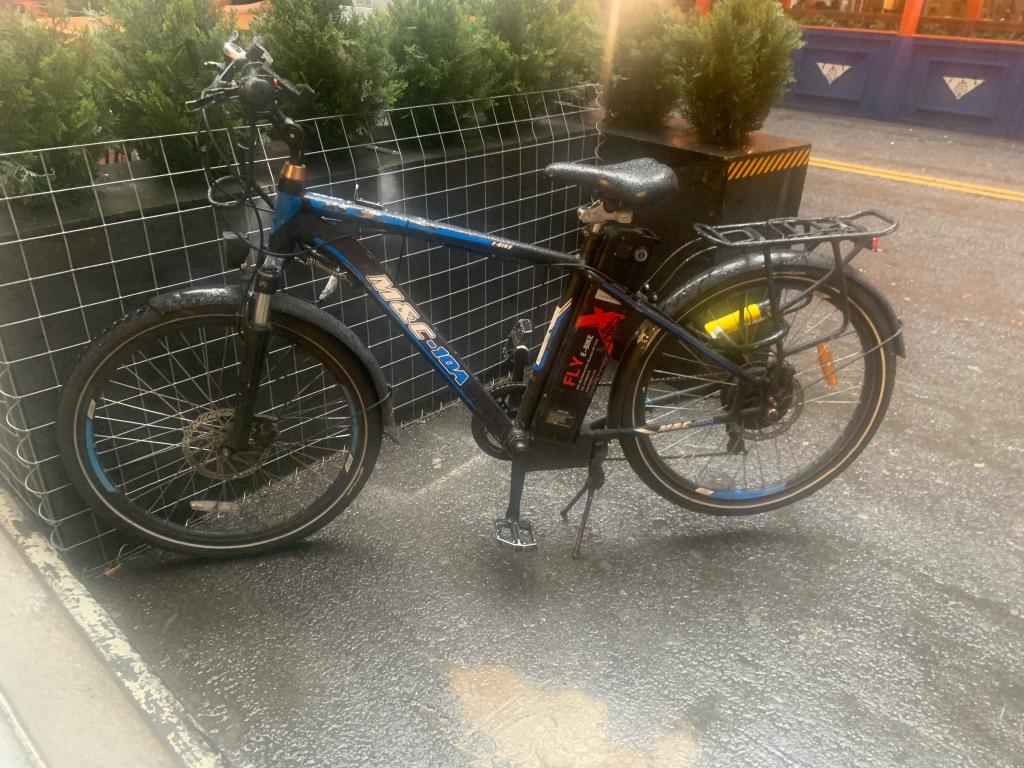How migrants are gaming apps to get black market delivery jobs in NYC
Contact The Author
The wave of migrants flooding into the city has sparked a black market economy for food delivery workers – with major apps like Doordash and UberEats taking advantage of the influx despite strict rules that prohibit hiring them, The Post has learned.
New migrants who file asylum applications must wait 180 days before they are eligible to work, a federal restriction that has pitted New York City against the Biden administration.
Nevertheless, The Post in recent days has observed throngs of migrants outside numerous Manhattan hotels now reserved for asylum seekers – including the landmark Roosevelt Hotel on East 46th Street – strapping on boxy backpacks and hopping onto their scooters.
The tidal wave of fresh migrants is not only pushing out veterans in a citywide food-delivery workforce that’s estimated at 65,000, but also depriving city coffers of tax revenue as the Big Apple’s tab for the migrant crisis for the fiscal year soars to roughly $5 billion.
One veteran delivery worker, 49-year-old Rosendo Tacam, told The Post that he had been working for DoorDash for 18 months before he was booted from the app despite passing its background check and having a federal tax ID number, which is required to open an account.
DoorDash froze his account in April and kept his last three days of payments totaling $450, he said.
“They deactivate you and leave you without work whenever they want and they do that as a way to control us,” said Tacam, who has been working in food delivery since arriving from Guatemala in 2007.
Eduardo Colina, 32, who moved to New York from Venezuela a month and a half ago, said he delivers food for Uber Eats using an American’s account. He pays the account holder – who landed a job in a restaurant and wasn’t using it – $150 every 15 days for access.
“I only deliver for Uber,” Colina said.
The food delivery apps have boomed since the pandemic, generating $217.6 billion in revenue last year, compared to $91.4 billion in 2019, according to business data platform Statista.
The companies do not break out their earnings by state, though New York City is the largest market for DoorDash, UberEats and Grubhub.
In July, the city passed legislation raising the minimum wage for app-based delivery workers to $17.96 an hour, not including tips. The companies have sued the city and it has yet to go into effect.
The new arrivals, meanwhile, take jobs the veteran workers are pushing back on – those that pay a base wage of as little as $2.60 for a trip that can take more than 20 minutes, sources told The Post.
“What we are seeing is an industry that’s growing, taking on more industries — pharmacies, groceries, liquor stores — and these companies now have a really large workforce at their disposal,” Ligia Guallpa, director of Worker’s Justice Project, told The Post. “They know they can send a $2 delivery job and someone will take it.”
Tacam, the veteran Doordasher, is one of at least 200 delivery workers who have been kicked off the apps this year, according to the group. The city agency that regulates delivery workers is now investigating 19 complaints of non-payment by Doordash, said a spokesman for the Department of Consumer and Worker Protection.
“We strongly reject these false and baseless allegations being peddled,” a Doordash spokesperson told The Post. “We can confirm that some of these Dashers were deactivated for providing false information and others were unable to confirm their necessary financial details. We have fair and clear standards that we hold all Dashers to, and we will always give anyone an opportunity to appeal if there is an issue with their account.”
The migrants typically pay an active account holder to use their accounts and pool their resources to buy or rent e-bikes.
One migrant, who gave his first name as Birhan, told The Post he pays $500 a month to an Uber account-holder – an amount that’s immediately docked from his earnings before he makes a penny.
He makes about $100 a day after putting in a 12-hour shift, he said.
“If you have just come to America and you have language problems, you are doomed to do this job,” he told The Post.
The app companies denied they are turning a blind eye to those breaking their account sharing rules, but admitted the workaround can’t be entirely stopped.
Doordash said it “has a rigorous, multi-layered identity verification system to help ensure Dashers are who they say they are. However, we understand that no verification system will ever be perfect, and that’s why we’re constantly working to further strengthen our safeguards against account inauthenticity.”
“It’s a serious issue that tens of thousands of people in New York City want to work, but don’t have the authorization to do so,” Uber said in a statement. “Uber supports open access to work, but we have processes in place to help prevent and take action on fraudulent behavior on Uber’s platform and will take additional steps if warranted.”
Those steps haven’t prevented the gauntlet of delivery bikes that confront businesses and pedestrians. The bikes are tied to street signs, scaffolding, and bunched up on sidewalks and curbs outside temporary shelters like The Rowe in Times Square and The Watson in Columbus Circle, along with the Roosevelt near Grand Central Station.
“The first thing people said to me was, ‘Get ready for the bikes,’” Fred Cerullo, president of the Grand Central Partnership Business Improvement District, told The Post.
“There are a lot of redevelopment projects going on in the neighborhood,” Cerulla added, “and the parking of that many bikes in one location would not be acceptable in any other neighborhood.”
The NYPD has confiscated around 7,000 unlicensed mopeds this year, but motorized scooters and e-bikes do not require a registration.
Colina has a battery-powered bicycle, which he bought for $800 from Fly E-Bike in Crown Heights, Brooklyn. He charges the battery there every night, at a cost of $50 a week.
He works six days a week, making between $80-$120 a day. After about three weeks delivering food, he’s only recently paid off the purchase of the bicycle.
“Everything I have earned so far I have spent on the bike and eating on the street while I work,” Molina told The Post. “The bicycle has a battery but it doesn’t last long and I have to pedal.”









